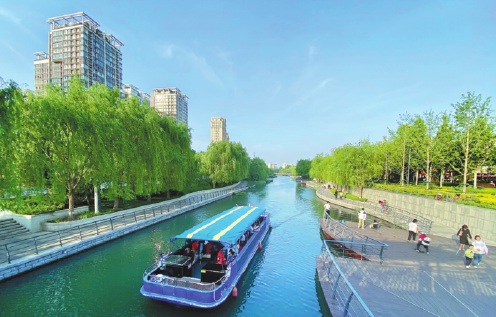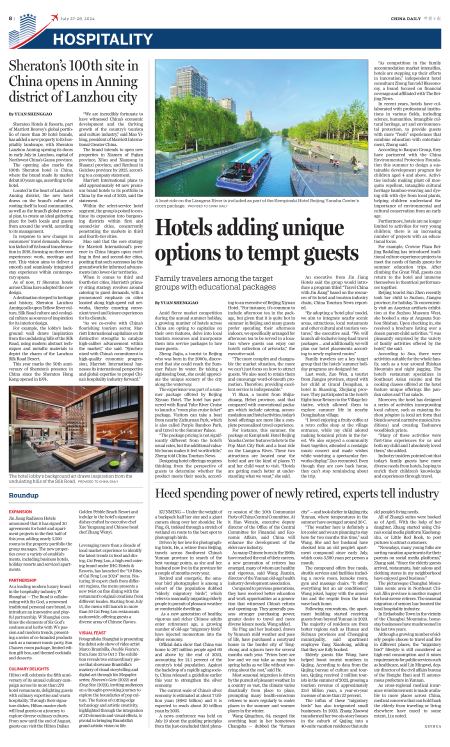
A boat ride on the Liangma River is included as part of the Kempinski Hotel Beijing Yansha Center's room package.
Amid fierce market competition during the annual summer holiday, a growing number of hotels across China are opting to capitalize on their own features, delve into local tourism resources and incorporate them into service packages to lure more guests.
Zheng Jiajia, a tourist to Beijing who was born in the 2000s, discovered that she could reach the Summer Palace by water. By taking a sightseeing boat, she could appreciate the unique scenery of the city along the waterway.
The experience was part of a summer package offered by Beijing Xiyuan Hotel. The hotel has partnered with Royal Yuhe River Cruise to launch a "room plus cruise ticket" package. Visitors can take a boat from nearby Zizhuyuan Park, which is also called Purple Bamboo Park, and travel to the Summer Palace.
"The package pricing is not significantly different from the hotel's usual rates, but the additional valuable bonus makes it feel worthwhile," Zheng told China Tourism News.
Designing hotel offerings requires thinking from the perspective of guests to determine whether the product meets their needs, according to an executive of Beijing Xiyuan Hotel. "For instance, it's common to include afternoon tea in the package, but given that it is quite hot in summer in Beijing and many guests prefer spending their afternoon indoors, we specifically arranged for afternoon tea to be served in a location where guests can enjoy our hotel's collection of artworks," the executive said.
"The more complex and changeable the market situation, the more we can't just focus on how to attract guests. We also need to retain them and encourage word-of-mouth promotion. Therefore, providing excellent service is indispensable."
Yi Shan, a tourist from Shijiazhuang, Hebei province, said that compared with conventional packages which include catering, accommodation and hotel activities, today's hotel offerings are more like a complete personalized travel experience.
For instance, this summer, the package at Kempinski Hotel Beijing Yansha Center features tickets to the Pop Mart City Park and a boat ride on the Liangma River. These two attractions are located near the hotel and are the kind of places Yi and her child want to visit. "Hotels are getting much better at understanding what we want," she said.
An executive from Jin Jiang Hotels said the group would introduce a program titled "Travel China with Jin Jiang" based on the resources of its hotel and tourism industry chain, China Tourism News reported.
"By adopting a 'hotel plus' model, we aim to integrate nearby scenic areas, attractions, local restaurants and other cultural and tourism ventures," the executive said. "We will launch all-inclusive long-haul travel packages … and additionally, we will plan our hotel placements according to newly explored routes."
Family travelers are a key target group that the hotels' summer holiday programs are designed for.
Last week, Zuo Wen, a tourist from Jiangsu province, stayed with her child at Grand Dongshan, a hotel in Shaoxing, Zhejiang province. They participated in the hotel's Eight-hour Return to the Village Initiative, which allowed them to explore summer life in nearby Dongjiashan village.
"I loved enjoying a fruity coffee at a retro coffee shop at the village entrance, while my child adored making botanical prints in the forest. We also enjoyed a community feast together, attended a nostalgic music concert and made wishes while watching a spectacular fireworks display," Zuo recounted. Even though they are now back home, they can't stop reminiscing about the trip.
"As competition in the family accommodation market intensifies, hotels are stepping up their efforts in innovation," independent hotel consultant Zhong Yan told Bkeconomy, a brand focused on financial coverage and affiliated with The Beijing News.
In recent years, hotels have collaborated with professional institutions in various fields, including science, humanities, intangible cultural heritage, art and environmental protection, to provide guests with more "fresh" experiences that combine education with entertainment, Zhong said.
According to Banyan Group, they have partnered with the China Environmental Protection Foundation this summer to design a sustainable development program for children aged 4 and above. Activities include making plant oil mosquito repellent, intangible cultural heritage bamboo-weaving and dyeing silk with dye from local plants, helping children understand the importance of environmental and cultural conservation from an early age.
Furthermore, hotels are no longer limited to activities for very young children; there is an increasing number of projects with an educational focus.
For example, Crowne Plaza Beijing Badaling has introduced traditional culture experience projects to meet the needs of family guests for summer education trips. After climbing the Great Wall, guests can return to the hotel and immerse themselves in theatrical performances together.
Beijing tourist Sun Zhen recently took her child to Suzhou, Jiangsu province, for holiday. To conveniently visit an Assyrian artifacts exhibition at the Suzhou Museum West, she booked a stay at Angsana Suzhou Shishan. Upon checking in, she received a brochure listing over a dozen parent-child activities. "I was pleasantly surprised by the variety of family activities offered by the hotel," she said.
According to Sun, there were activities suitable for the whole family, such as a tour around Shishan Mountain and night jogging. The hotel's restaurant specializes in Southeast Asian cuisine and the cooking classes offered at the hotel feature unique offerings like pandan cakes and Thai salads.
Moreover, the hotel has designed a series of activities incorporating local culture, such as enjoying Suzhou pingtan (a local art form that blends several narrative musical traditions) and creating Taohuawu woodblock prints.
"Many of these activities were first-time experiences for us and both my child and I absolutely loved them," she added.
Industry insiders pointed out that today's family guests have more diverse needs from hotels, hoping to enrich their children's knowledge and experiences through travel.

